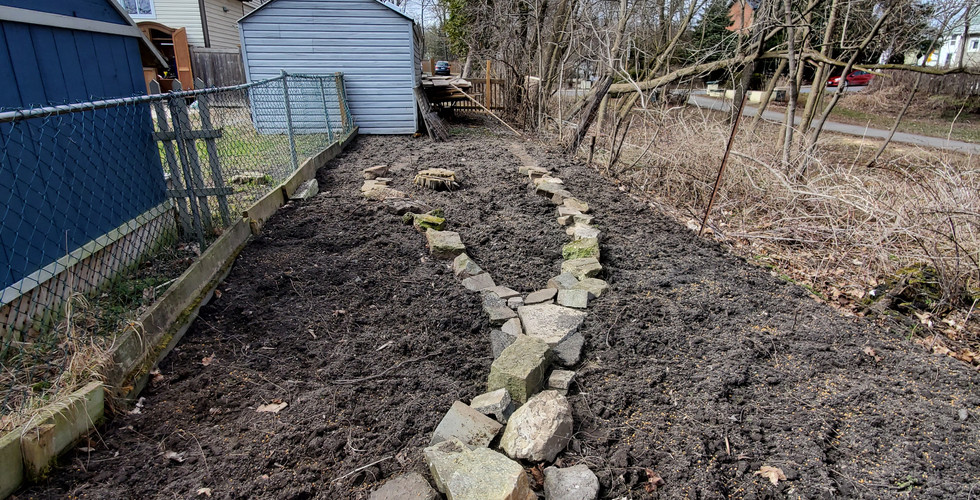How to Prep Your Soil
- Admin Domain
- Apr 19, 2020
- 5 min read
Easter weekend has just past and it couldn't feel further from normal. We spent our weekend mostly outside, soaking up the sunshine and feeling the wind on our faces. Giving TLC to our yard rather than a traditional turkey dinner and family gathering. All thanks to COVID-19. Nevertheless, the yard has kept us busy and we're far from bored. Every day working on it is a day closer to paradise.
I was forced to learn and think about what can impact the health of plants. Thankfully for me, and maybe for you, too, the crop and harvest outcome is not solely based on skills. Phew! Things like unpredictable weather and pests can change the volume and health of your crop overnight. Doing your very best and yet running into challenges beyond control along the way is nothing but normal. Reading that made me feel like ok - it's not just me. I'll be happy with even the tiniest of harvest from practice and what I've learned. One thing's for sure - I'm learning a heck of a lot.
Soil - The Oxford Dictionary
“the upper layer of earth in which plants grow, a black or dark brown material typically consisting of a mixture of organic remains, clay, and rock particles.”
Over the long weekend the temperatures were pretty good. It's been an early spring which is a great start to my first year as a gardener - above seasonal temperatures, lots of rain and some sunny days. It's really a perfect storm - ha ha, I did just say that.
Weather is only half the battle though. There's still a lot that can go wrong underground.
Here's a breakdown on what you might find in the soil:
1. Rocks:
Big or small. Rocks aren't really bad for the garden again, depending what you're planting. Typically, any root vegetables you grow you want to have them steer clear of rocks or any other obstructions underground. The obstructions will prevent the vegetables from growing fully and look deformed (but they should still be fine to eat!)
2. Bugs:
Worms are the first that come to mind, and they're friendly in the garden. They help break down organic matter, and as they move around they create tunnels which allow air to pass through. If you find worms, keep them! Other critters that might not be too friendly include grub worm and June bugs. I have come across some of these. Different species prefer to eat different vegetation, whether it be the leaves or the roots. Mine apparently like to eat roots, grass roots. I guess we'll find out if I have any issues with the vegetable garden over the summer. Brown patches are a telling sign.
3. Weeds:
The more you can treat your garden at the beginning or end of gardening season, the better. You don't want to be wasting your time pulling weeds all season long if you can prevent it. If you have a lot of weeds, the organic way would be to lay down plastic the year before and let it sit until the following year. I didn't do this, but I did find some organic cornmeal gluten in the back shed. I wanted to stay away from any pesticides, and I made sure to read the package carefully before applying. Basically after applying with some rain or water, the corn gluten melts and creates a film layer that chokes out baby weeds from emerging. Since I applied this 2 weeks ago and we've had lots of rain, I'm hopeful it should be ok and not impede the new plants and seedlings that were planted over the weekend.
4. Roots:
This is more obvious if your garden is by a tree or some shrubs. Since I live next to some city property and there's a giant walnut tree nearby, roots was something I acquainted frequently. Just basically work the soil until it's root-free.
All of the above lead my worries, that the soil in the garden won't be great. I've been tilling it by hand and noticed the soil has everything that I listed above. I also noticed that it gets really thick after it gets wet. If the soil is too compact, the little seedlings won't be able to pierce through. I did some reading and turns out that sand is a great substitute for potting soil if you're short, and well, we're short on a lot of things these days. We happened to find some sand by accident by digging far down in the ground. The compost has been decomposing since last summer in my make-shift garbage-compost bin and I found some fertilizer in the back of the shed that was purchased last year.
So I threw down some sand, compost and organic fertilizer and mixed it all together with the cultivating hoe. There's really only one way to find out if anything is going to grow here!
Some other things to consider...
What soil temperature should you aim for?
It really depends on what you're planting as every species has different needs. Because I'm trying to grow a variety (and I think most people are too) it's a good idea to have a variety of soil conditions (is that even garden lingo? 😂) Currently I have cool and warm patches in the garden bed. The cooler areas basically have shade for a longer period of time, and the warmer areas have more direct sun. Obviously the time of year will also need to be considered. If starting early spring or continuing into the fall, make sure you have some frost protection for the plants that need it.
What pH should your soil be?
Depends on plant preferences, obviously. Ideally you want to be neutral, like 5.5-6.5. A neat trick to have an idea on the pH level is by using baking soda and vinegar. Get two separate cups of wet soil ready. Add a bit of vinegar to one, and a bit of baking soda to the other. The one that bubbles will give you the indication whether the soil is acidic or alkaline.
Finally, the last part to your soil is something a little more fun - placing the stepping stones! I love a rustic and natural look. There's a creek that runs along the edge of our property and there's a bunch of rocks there, so we lugged them all the way to the other side of the yard where the garden is and I spent the day digging up the trench to place the stones. Don't forget about placing some stones within the garden beds too, because this is how you'll be able to reach all the planted beauties!!
Happy gardening!












Comments